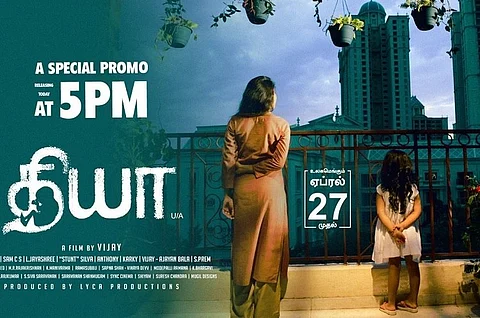

*Some spoilers ahead
It's hard to dislike Sai Pallavi in any film. When she's on screen, lips quivering, eyes reflecting changing emotions in a span of a few seconds, she makes you buy into her character so completely. As Tulasi in Diya, which marks her Tamil debut, Sai Pallavi plays a young woman who is haunted by a decision that was made on her behalf in the past.
If you've followed the promos of the film, you'd know what this decision is. In fact, you'd know the entire storyline of the film. This puzzled me and I kept waiting for a twist, an unexpected turn, that would make us look at the events thus far with new eyes. Instead, the film plods along in the most predictable way, even over-explaining things within its short runtime.
Before the film's release, AL Vijay had said that it would revolve around the "complex" issue of abortion. But this complexity is entirely missing from the script, as the story turns into an alarming pro-life sermon. From the title cards which show an abortion being performed, adequately demonising the equipment used to do the same, the film never for a moment tries to engage with the idea that abortion is an important reproductive right. A right that women in many parts of the world are still fighting for.
The deaths take place all too easily (all of them in enclosed spaces, reiterating the idea that abortion is murder). The ghost could have been swatting flies and it would have made no difference because we have no emotional investment in any of the characters, save Tulasi. RJ Balaji as the sirippu police and Santhana Bharathi as a...I'm unsure what he was doing in the film...only serve to distract. Naga Shourya, as Krishna, Tulasi's hapless husband, doesn't have much to do other than look perpetually worried or confused. This is not the fault of the actors. AL Vijay seems to have been clueless about where to go with his one-line story. Sam CS's background score keeps trying to push us to the edge of our seats, but then, nothing happens.
True, Diya isn't a conventional horror film. But the film is too safe, telling a story of motherhood from the same-old male perspective, for it to wear the badge of a rebel. Jennifer Kent's supernatural thriller The Babadook, for example, was truly terrifying because it was an intimate study of a mother-child relationship – and although very real and familiar, the fear it inspired in the audience came from how rarely we've seen this on screen.
In Diya, the scenes when Tulasi and Diya (Veronika) bond have a certain tenderness, even if they ride heavily on the over-exploited mother sentiment. I did wonder if I was being too harsh on the film. Tulasi, after all, wants to keep the fetus and abortion is not her decision (though she and her partner are only 19 at that point). Should we then only look at this as one woman's story?
Such questions that Sai Pallavi's compelling performance raised were flatly laid to rest by the "message" in the end that asks us to think about all the "unborns" who could have become Sania Mirzas or Indira Gandhis. EH?! How about wondering how 19-year-old Tulasi could have become a doctor if she'd gone ahead with the pregnancy? The filmmaker further informs the audience that 56% of abortions in the country are unsafe. Isn't that precisely because of the stigma surrounding abortion? And doesn't this film add to that? How is this statistic of relevance when the abortion in the film is conducted by a medically qualified professional? Tulasi's "agency" loses its shine when you see the film in its entirety.
Perhaps the real "message" young women who watch this film should take home is: If you miss your period, pee on a pregnancy stick (available in every pharmacy) and don't go running to your family doctor.
Disclaimer: This review was not paid for or commissioned by anyone associated with the film. Neither TNM nor any of its reviewers have any sort of business relationship with the film's producers or any other members of its cast and crew.